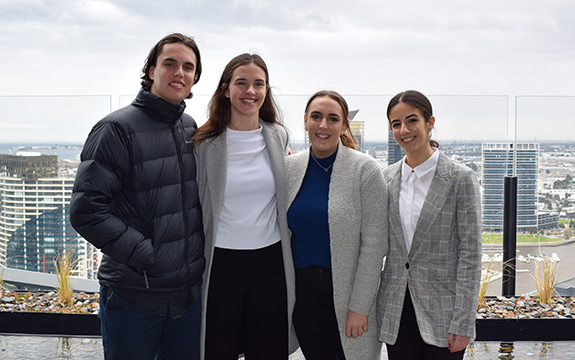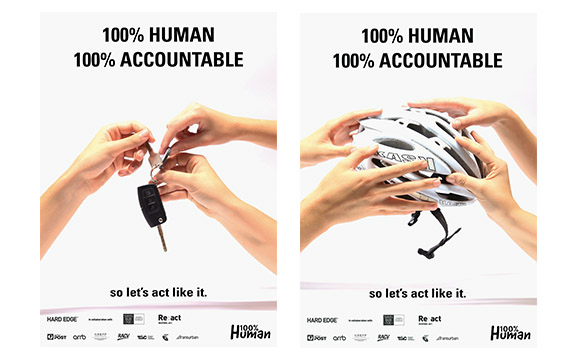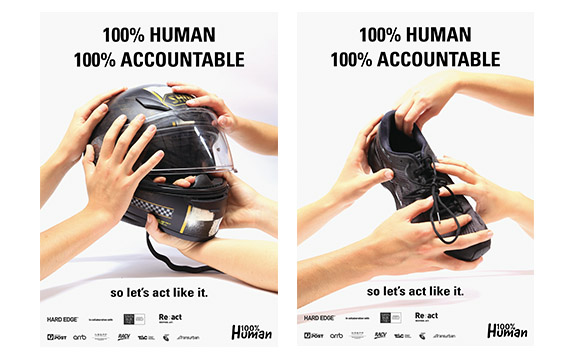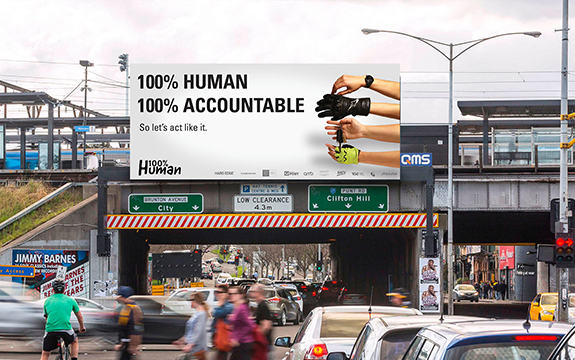Communication Design students take road safety campaign to Transurban

In Summary
- A team of Communication Design students presented their road safety campaign to toll-road operator Transurban
- The students created the campaign as part of behavioural change program Re:act 2019
- Their campaign, ‘100% Human’, highlighted how all road users play a role in keeping each other safe
A team of Swinburne Communication Design (Honours) students presented their road safety campaign to world-leading toll-road operator, Transurban, as part of the Re:act 2019 road safety awareness program.
Caitlin Gmehling, Felicity Lemke, Max Bufardeci and Riley van Ingen were invited by Transurban’s Road Safety Manager, Liz Waller, to the company’s Melbourne headquarters to share their campaign, ‘100% Human’, with its staff.
Each year the Re:act program enables university Communication Design students to engage with industry to create a campaign that raises awareness of road safety issues among 18 – 25 year olds and changes their behaviour. The 2019 brief focused on encouraging safe interaction between drivers and vulnerable road users such as pedestrians, cyclists and motorcyclists.

 The students' campaign, '100% Human', highlighted how all road users play in role in ensuring one another get to their destination safely.
The students' campaign, '100% Human', highlighted how all road users play in role in ensuring one another get to their destination safely.
Caitlin, Felicity, Max and Riley were among 43 students from Swinburne and University of Technology Sydney (UTS) who participated this year, with guidance from their respective teachers, Swinburne’s Communication Design Program Coordinator, Anthony Elliot, and UTS Visual Communication Design Lecturer, Nicola Hardcastle.
Their ‘100% Human’ campaign highlighted how all road users play a role in keeping each other safe and was selected by the judging panel as the best campaign created by Swinburne students.
“The main things we focused on were vulnerability and shared responsibility, and how we could communicate those to people our age in a way that was engaging,” says ‘100% Human’ campaign co-creator, Caitlin Gmehling.
“We wanted to communicate how each individual plays a role in the bigger picture but we wanted to communicate that through unifying everyone, showing that we’re all the same and we all need to be working together for the same end goal, which is to get to our destination safely.”
Re:act was launched in 2016 by creative agency, Hard Edge, in collaboration with Swinburne’s School of Design, and is supported by Australia Post, the National Road Safety Partnership Program, RACV, TAC, Telstra and Transurban.
In 2019, the program expanded to include University of Technology Sydney (UTS) and welcomed the support of Insurance Australia Group, Transport for NSW and 3M.
UTS student Beth Sacco’s campaign, ‘#ThanksMate’, which reinforced positive behaviours by thanking road users for doing the right thing by each other, was selected as the best campaign created by UTS students.
Advertising company, oOh! Media, also joined forces with Re:act in 2019, and will roll out both, ‘100% Human’ and ‘#ThanksMate’, across its digital assets in universities, bars and retail spaces.
“This is a great outcome and aligns perfectly with our vision for Re:act which is to launch the students work into the broader public so they can have the experience, be recognised, and have their campaigns have a positive impact in the world,” says Hard Edge Managing Director and Re:act founder and CEO, Andrew Hardwick.
 A mockup of the students' campaign, '100% Human', on one of Melbourne's busiest roads.
A mockup of the students' campaign, '100% Human', on one of Melbourne's busiest roads.
Re:act plans to continue to grow in the future, so more students across Australia and beyond can raise awareness of road safety issues and promote behavioural change among their peers.
“I highly recommend other universities get involved in Re:act, as it is a focused and well managed program where students are transformed through the process,” says Swinburne’s Department of Communication and Digital Media Design Chair, Associate Professor Nicki Wragg.
“By developing a behaviour change campaign, they too go through behaviour change and learn how to share the road in a safer and more tolerant way.”
Transurban praised the program and is keen to continue its support.
“Transurban is really proud of this road safety initiative and the opportunity it provides young people at the outset of their careers," says Transurban’s Road Safety Manager, Liz Waller.
"We look forward to supporting Re:act again in 2020."

